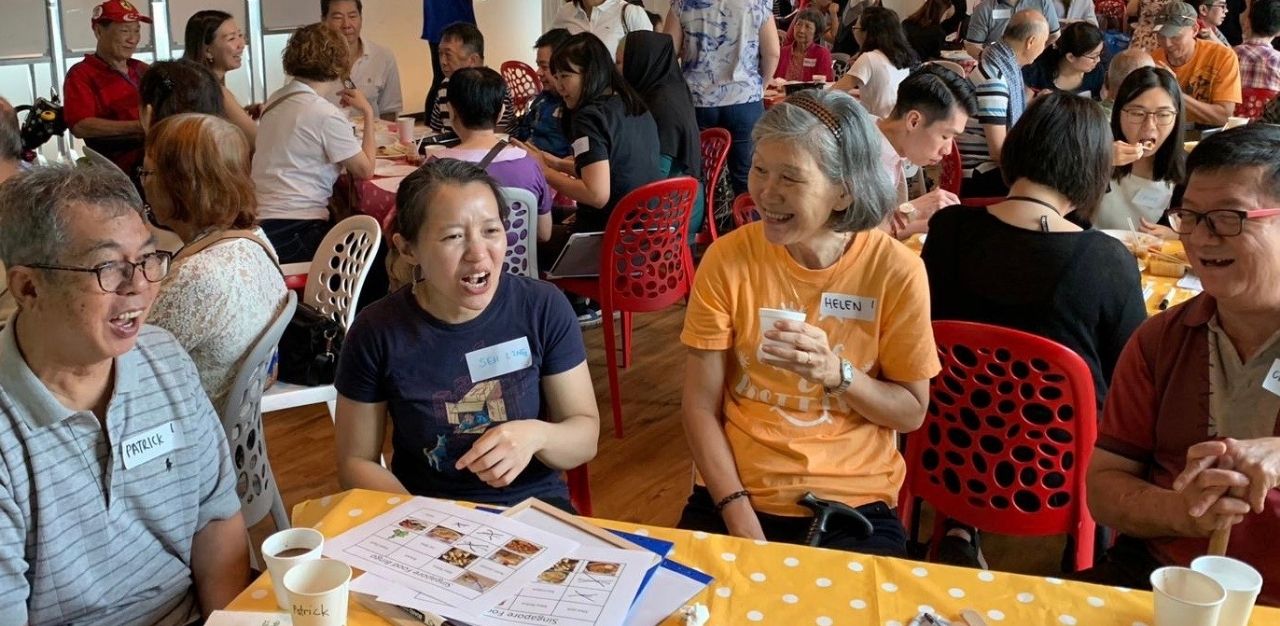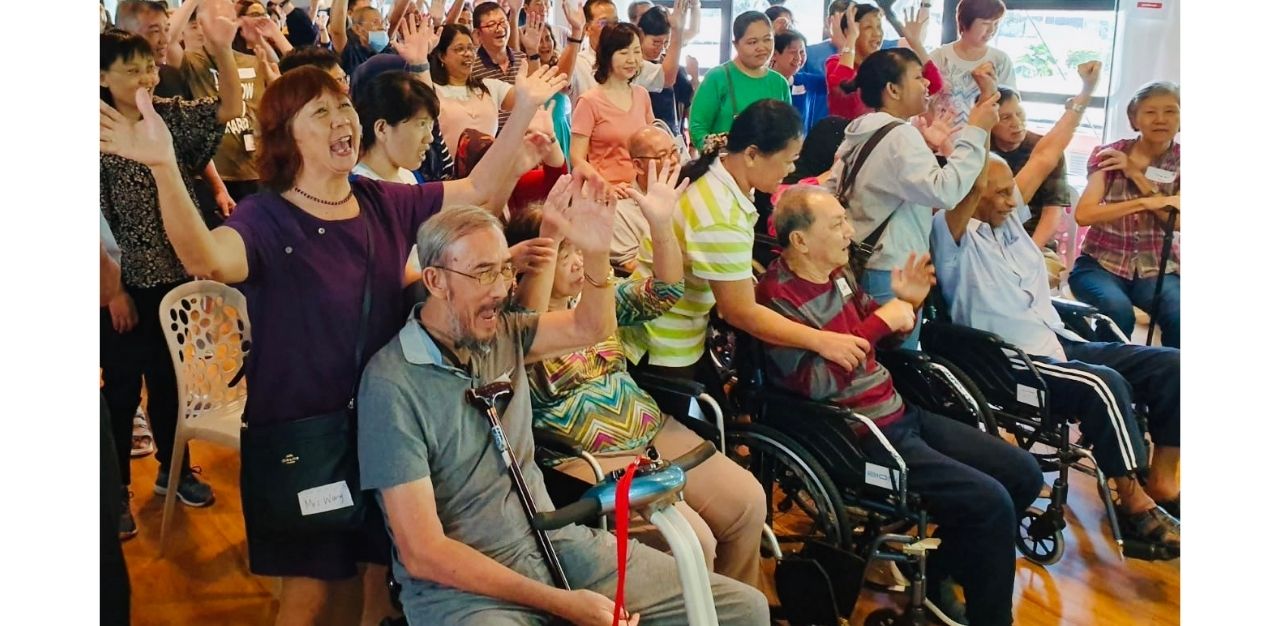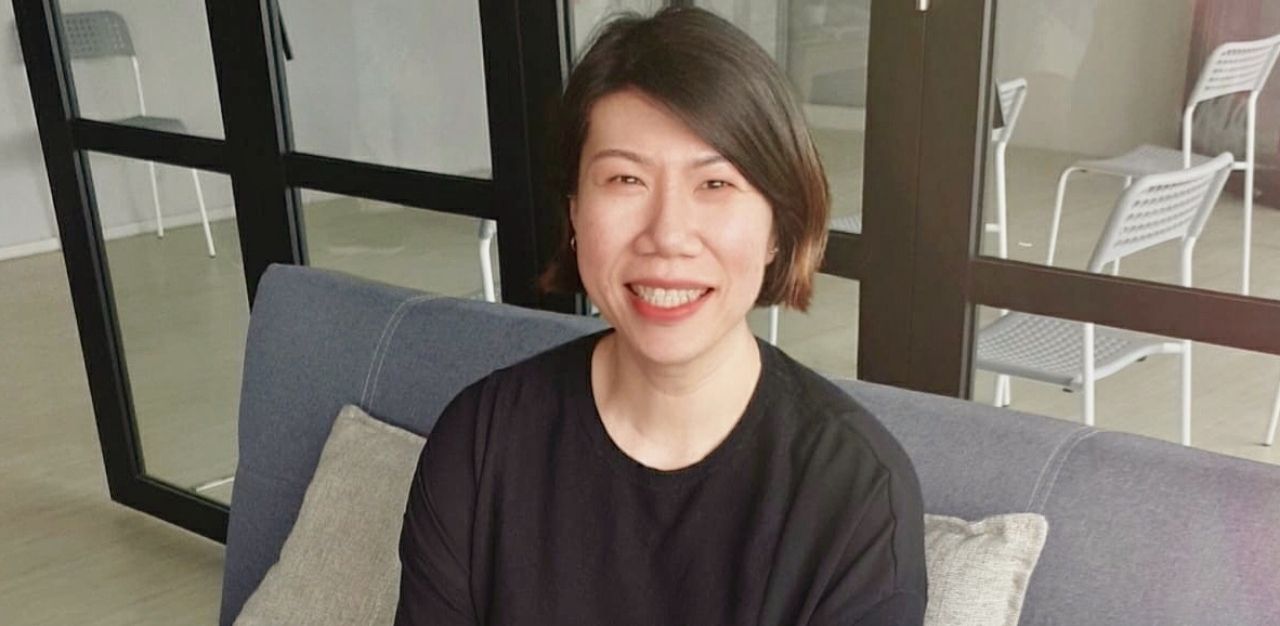She was heartbroken when the hawker stall holder started shouting at her patient because she could not understand what the patient was trying to say.
This is the world of aphasia sufferers – one of misunderstanding and unkindness, and speech and language therapist Evelyn Khoo is working towards changing that through her non-profit organisation Aphasia SG.
Aphasia is an acquired communication impairment where the language lobes of the brain suffer injury or damage. The injury can be caused by stroke, traumatic brain injury (TBI), brain tumour, brain infection, and progressive neuro diseases. It can affect speech, understanding of languages, reading, writing, or using numbers.
For sufferers, it is like going to a foreign country where they struggle because they do not speak the language well and many of them become withdrawn and avoid going for therapy because of frustration from doing therapy tasks.
Ms Khoo has encountered many patients with aphasia throughout her career as a speech therapist working in different clinical settings such as acute and community hospitals, community day rehab centres and nursing homes. She realised the tremendous psychosocial impact aphasia has on both the sufferers and their loved ones.
Being a word nerd who loves playing word games and is interested in language and working with people, Ms Khoo ventured into speech therapy as a mid-career switch. After getting a bachelor’s degree in communication studies, she worked for several years before embarking on a Masters of Science in Speech and Language Pathology to become a speech therapist. “A lot of public attention is usually paid to physical disability. However, communication disability is marginalised,” Ms Khoo says, adding that she started Aphasia SG to create awareness and educate the public on the disorder.
TheHomeGround Asia (THG): What is the rationale behind the launch of Aphasia SG?
Evelyn Khoo (EK): Advocacy for aphasia is more developed in the West than in Asia. The disorder is difficult for people to understand as it affects language, not intellect. You can call it an invisible disability that can happen to anyone regardless of age, race, gender, and profession. In Singapore, it’s estimated that about 3,000 adults are diagnosed with aphasia every year. This is more common than cerebral palsy, Parkinson’s and ALS (amyotrophic lateral sclerosis). It affects a person’s quality of life (QOL) more than cancer or dementia.
I started Aphasia SG when I saw that there was no community support for people with the condition that goes beyond their hospital stay. It takes many years for people to overcome aphasia and the accompanying mental health issues. Other countries have support groups but Singapore doesn’t, so I started Aphasia SG as a way to prevent social isolation for those with the disorder. I remember an aphasia patient in the hospital who was progressing well in the rehabilitation ward. When he was about to be discharged, we took him on a community outing to help him reassimilate to the community and learn how to order food. While he did well in the hospital, he did not at the hawker centre. The hawker shouted at him impatiently even though he was trying his best to order by pointing at the sign when he could not get his words out. That was when I first saw the setbacks that persons with aphasia (PWA) potentially face in real life, and that they need patient communication partners. Social interaction is important for persons with aphasia (PWA) and we need to find ways to support them. That was why I created Aphasia SG to give them a platform to come together.
THG: But there are many types of aphasia. So how do you categorise them in order to help sufferers?
EK: There are two main types of aphasia — expressive and receptive. If you have expressive aphasia, you have difficulty expressing yourself. You may be able to comprehend but can’t express your thoughts. In addition, you cannot verbalise words. In receptive aphasia, you are fairly fluent in speech, but you have great difficulty understanding what is being said. The sounds become distorted by the brain. It’s not a hearing problem, it is a neuro-processing problem. As therapists, we find out the patient’s strengths and capitalise on them to compensate for their weaknesses. For instance, if spelling is a patient’s strength – he may be able to cue himself by spelling out the word to get it into his head and then saying it.
THG: Do you see all aphasia patients? Do they suffer from the same types of aphasia?
EK: My day job includes work at a community rehabilitation centre called the Abilities Beyond Limitations and Expectations (ABLE). I also have my own private practice at START – Speech Therapy & Rehab Training. On average, I see about 25 clients in a week – they are mostly patients with brain injuries who have cognitive and communication impairment, some with swallowing difficulties. I value quality over quantity – what’s important is to help patients achieve desired and realistic therapy outcomes. The Aphasia SG community has around 150 members including persons with aphasia and their loved ones.
THG: Are there volunteers working with aphasia sufferers at Aphasia SG? Are they trained?
EK: We currently have 40 active volunteers and we ask for all our volunteers to be trained. They need to be committed to helping out at our programs once or twice a month. We teach them an approach called “Supported Conversation for Adults with Aphasia” so that they can learn to communicate better with people who have aphasia.
THG: Then what are some of the methods used to get clients to learn to speak again?
EK: The methods are very customised to the needs of the individual. We carry out different types of therapy activities. For example, if the person with aphasia has problems with word-finding, we may focus on naming tasks using common household items or things that are important to the individual. If it’s mild aphasia, we may get them to do more sentence-level rehabilitation by scaling up from the word level ones. An example of a therapy goal could be to write a simple email in three months.

When it comes to Aphasia SG, the emphasis is on community and social interaction. Our flagship events at Aphasia SG are Chit Chat Cafe and Aphasia SG Choir. These programmes are evidence-based and conducted by trained volunteers. With Chit Chat Café, our volunteers are trained to support the conversations of members – even those with severe aphasia. It is a safe space for the individual to practise talking to regain confidence. In terms of the choir, we are using music and rhythm to tap on the uninjured brain cells to facilitate verbal output. Our programmes used to be conducted in person; however, since COVID started, everything has moved online. We run an average of 8 Zoom activities a month for our community.
THG: What do you do when you encounter face to face resistance?
EK: Some persons with aphasia do not like attending online sessions. We hope that their family members can convince them to attend by participating together. In some instances, the caregivers join the Aphasia SG programmes on their own as they find that it benefits them to meet other members of the community. After all, at Aphasia SG, we support not just the person with aphasia but their families too. We also run regular training workshops by fellow professionals, such as having nutrition workshops by dieticians, or caregiver talks by various healthcare professionals.
THG: What is the most common misperception or limiting belief about aphasia and its management?
EK: Often a person with aphasia is mistaken as someone who is intellectually lesser — less smart, or stupid even. They are still who they are – just that they need support in their linguistic ability. It is not a cognitive impairment. People who don’t understand aphasia think that aphasia sufferers are intellectually disabled. Some family members who don’t understand may talk down to a person in a childish way, or shout at them. A member of our community shared his patient experience at a public talk about aphasia. He was offended by a neurologist, who only spoke to his wife and not him even though it was about his health. His wife had informed the doctor that her husband could understand but had expressive difficulties. Despite that, the doctor insisted on speaking directly with the wife which made him feel frustrated. It was a good reminder to the healthcare professionals present at the talk to always respect and address the individual with aphasia.
Did you know – English actress Emilia Clarke suffered from aphasia when she was 24 after brain surgery to remove her brain aneurysms? She couldn’t even say her own name then. As an actress, not being able to access language is horrifying. Finally, she opened up about it in 2019 and started SameYou, a foundation in the UK to support brain injury survivors. Sharon Stone also developed aphasia and a stutter because of her stroke but has since recovered after a decade out of the limelight. These celebrity stories are inspiring but closer to home, many of our community members have shown that it is possible to live well after a major life-changing event of having brain injury and aphasia. Check out “Stories to Inspire” on our website to read more personal accounts.
THG: It must be hard to keep up with and juggle so many things. What keeps you up at night?
EK: There is just so much work that needs to be done for aphasia. Even though Aphasia SG has been around since 2019, we need to do more about facing awareness. Outreach and public events are still not enough. Not enough people know about Aphasia. Usually, understanding and empathy come later after knowing. People are not generally unkind. I believe the hawker who was impatient with my patient, for instance, wasn’t being deliberately unkind. She just didn’t know about aphasia or understand that some people can suffer from communication difficulties without physical impairment. About 10 to 15 years ago, people didn’t know about autism, and we might have judged a child behaving badly or their parents. Now we won’t come to that conclusion immediately.

THG: How has your involvement with Aphasia helped in your approach towards life? In what way has it changed you as a person?
EK: It makes me think about what I would do if I have no means to communicate, and how I will function. I have learnt so much from the patients I work with – their mental and emotional resilience. I feel inspired by their caregivers, and realise how difficult it is to care for someone with a disability. I have learnt to become a more holistic practitioner; regarding each patient as an individual and not just a case or number. As a therapist, I aim to help the person do well in his or her life, and not just at the clinic once or twice a week. It needs to translate to what the patients can do in their daily life.
THG: What keeps you going in tough times? How do you handle clients, say, during the circuit breaker or the heightened alert periods?
EK: For my professional work, we turned to telehealth and rehab to improve service delivery. Clients with proper hardware are able to switch to Zoom online which has whiteboard and share screen capabilities. Aphasia SG programmes have all transited to Zoom too.

THG: What were the highest and lowest points in your journey then?
EK: It warms my heart when caregivers and patients say, “I benefited so much from your programs”. It is during these times when we know that what we are doing has a real impact on people’s lives. Our lowest point is when we are strapped for resources. There are missed opportunities but we had no choice because of a lack of financial resources and time. Our team members all have day jobs and the people running day to day operations are interns, helping to do administrative work.
Check out the services at Aphasia SG here.
Join the conversations on TheHomeGround Asia’s Facebook and Instagram, and get the latest updates via Telegram.




























